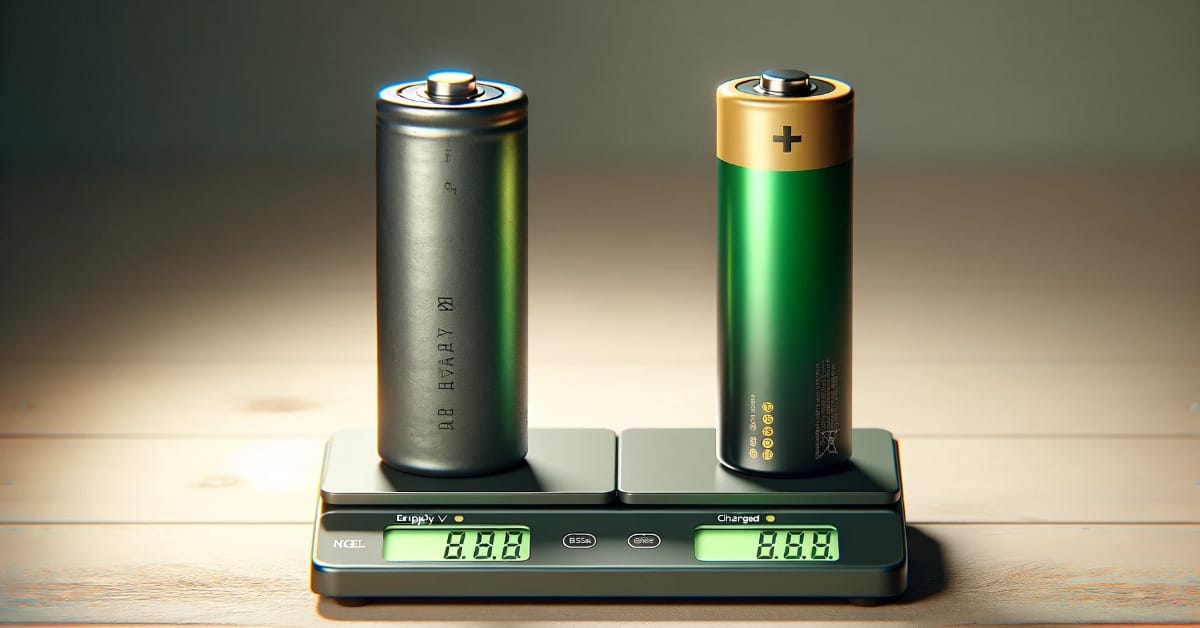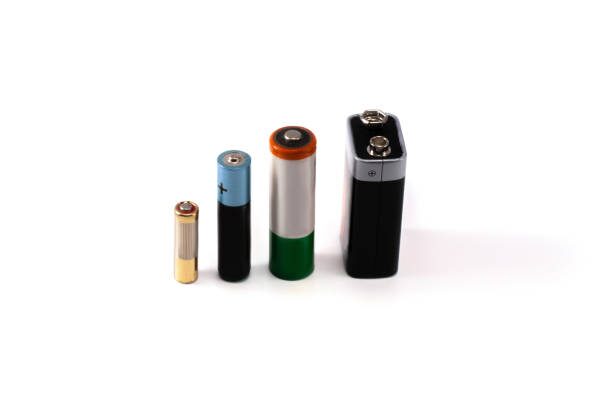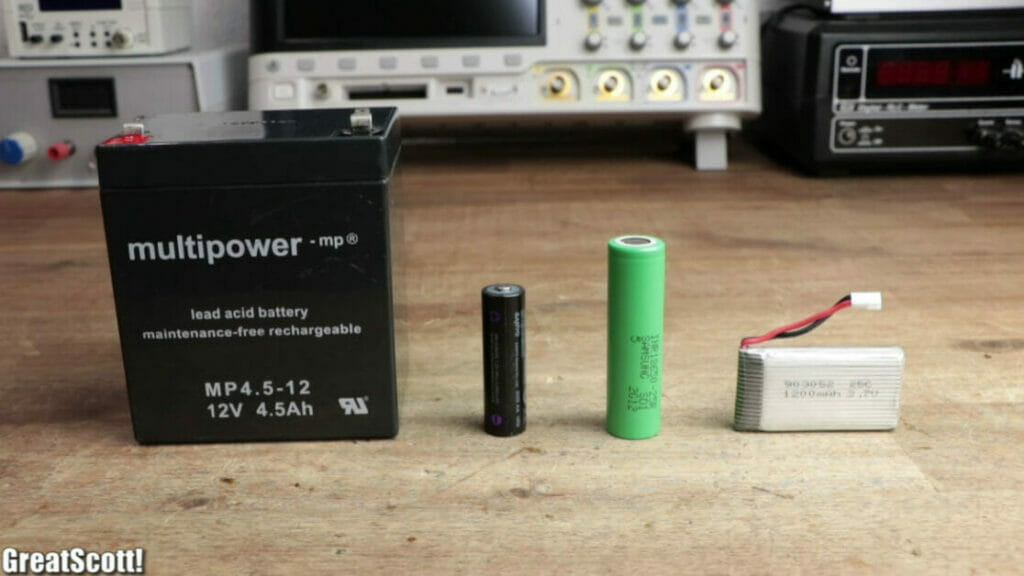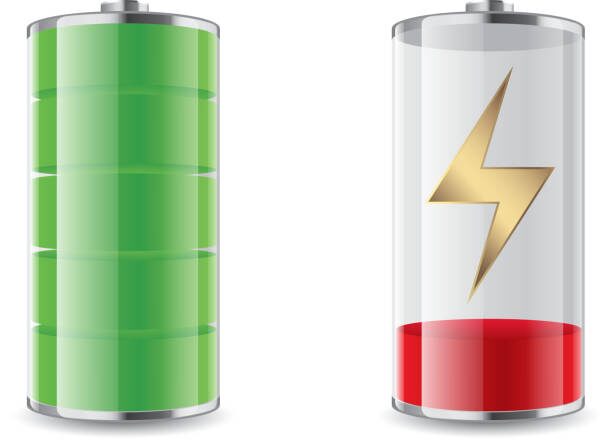Do Batteries Weigh More When Charged? (Myth Busted)

Have you ever wondered if batteries weigh more when they’re charged? It’s a question that’s sparked curiosity in many minds.
Batteries are heavier when charged because of the ions inside of them. Ions absorb energy until they reach their maximum capacity or highest energy state. All of the absorbed energy stockpiles add to the battery’s overall weight. Converting the stockpiled energy to electrical energy will make the battery lighter until all the energy is used.
We’ll explore the intricate science behind batteries, their charging process, and how they affects their weight. You might be surprised by what we uncover. So, let’s get charged up for this electrifying discussion!
Understanding Batteries

Let’s talk about batteries, the unsung heroes in our gadgets and tools. These little powerhouses are fascinating when you get to know them. They do a brilliant job of turning chemical energy into the electrical energy that powers our lives.
Let’s look at the different types of batteries out there. First, we have the usual – alkaline and lithium-ion batteries. These are your standard, run-of-the-mill batteries, from your TV remote to your smoke detectors. They do their job, and then, well, that’s it for them.
But then, you’ve got the rechargeables, like nickel-cadmium and lead-acid batteries. These guys are the real MVPs in my book. I’ve used them in everything from my power tools to my laptop. What’s cool about them is their ability to bounce back. You use and recharge them; they’re good as new, ready for another round.
In my line of work, where reliable power is a must, I’ve seen these batteries in action, and they never fail to impress. Charging them up isn’t about cramming more stuff inside; it’s more about rejuvenating the energy they’ve already got.
Now, I’m going to take you further into this amazing world. So, let’s jump in and keep this energy flowing!
How Charging Affects Battery Weight

Ever been curious about why batteries feel a bit heavier when they’re charged? I’ve pondered this while swapping out batteries on various projects. Let’s break down this electrifying phenomenon.
The Role of Ions in Battery Weight
It all starts with ions – those tiny, electrically charged atoms in batteries. These little powerhouses are why your battery can store and give out electrical energy.
Here’s the cool part: when you charge a battery, you give these ions an energy boost. They get all excited and jump to a higher energy state.
Picture your battery as a piggy bank. It doesn’t weigh much empty, right? But as you start filling it with coins (or, in this case, energy), it gets heavier. The ions in a charged battery are like a piggy bank full of coins.
Energy States: From Empty to Full
Charging a battery increases the ions’ energy state, similar to filling up that piggy bank. Those ions hold onto this energy until the battery is fully charged – at their maximum energy state.
Then, when you use the battery, it’s like you’re taking coins out of the piggy bank. The energy gets released as electrical power, and the ions return to their ground state, or ’empty.’
On the job, using power tools and gadgets, I’d have to swap batteries now and then. You’d think the weight difference would be noticeable, right? But honestly, it’s pretty subtle. The changes in ion energy don’t make your battery significantly heavier.
So, there you have it. The ions getting their energy boost and then releasing it is behind this fascinating process. It’s a tiny change but crucial to how batteries store and release power.
Debunking Battery Myths: The Real Story Behind Common Beliefs

I’ve heard many myths while working with batteries over the years. It’s time to separate fact from fiction and give you the real scoop on what’s true. It’s just a tall tale regarding batteries.
- The Overnight Charging Myth
- One myth that keeps popping up is that charging your phone overnight damages the battery. Modern smartphones are pretty clever. They know when to stop charging. I’ve left mine plugged in overnight more times than I can count, and it’s still going strong. The real wear and tear on your phone’s battery comes from how you use it throughout the day, not from how you charge it at night.
- The Full Discharge Fallacy
- Remember the old advice to drain your battery completely before recharging? Well, that’s outdated info. It was true for the older nickel-cadmium batteries because they had a memory effect. But today’s lithium-ion batteries? They prefer not to be fully drained. Draining it fully shortened its life considerably. So, charging them before they hit rock bottom is better with modern batteries.
- The Overcharging Explosion Myth
- Here’s a scary one that’s been floating around: batteries exploding if overcharged. Now, while it’s true that there have been some incidents with batteries overheating or catching fire, it’s not as common as you might think. Quality batteries from reputable brands come with safety mechanisms that prevent overcharging. In all my time using batteries for various projects, I’ve never had one blow up on me. So, while it’s important to be careful, don’t believe the hype that every overcharged battery is a ticking time bomb.
Don’t get caught up in old wives’ tales – stay informed and treat your batteries right. They’ll serve you well for a long time if you do.
Practical Tips: Maximizing Battery Life and Performance
Let’s get down to some real talk about keeping your batteries in top shape. I’ve picked some handy tips from my hands-on experience with all kinds of batteries to make them last longer and work better.
- Keep It Cool: Batteries, especially lithium-ion ones, are not fans of extreme temperatures. I’ve seen my share of overheated batteries, and it’s not pretty. Keep your devices and batteries away from direct sunlight or hot cars. Cooler conditions help extend their lifespan.
- The Charging Sweet Spot: You don’t always have to charge your battery 100%. In fact, for lithium-ion batteries, I’ve found that keeping them between 20% and 80% can prolong their life. It’s like not pushing your car to its limits every time you drive.
- Avoid Complete Discharge: Letting your battery drain completely, especially frequently, can be a quick ticket to its demise. I remember doing this with an old phone, and soon enough, the battery barely held a charge. So, try to recharge before it hits the dreaded 0%.
- Regular Use and Exercise: Batteries like to be used. If you’ve got rechargeable batteries lying around, don’t let them gather dust. I make it a point to rotate through my rechargeable batteries in various devices. It keeps them fresh and ready to go.
- Proper Storage: Store it properly if you don’t use a battery for a while. For lithium-ion batteries, a charge level of around 50% is ideal for storage. And keep them in a cool, dry place. I’ve got a drawer just for this purpose.
- Mind the Charger: Not all chargers are created equal. Using the right charger for your battery makes a difference. I’ve seen cases where a wrong charger can spell the end of a battery’s life. Stick to recommended chargers or those with good quality standards.
- Recycling the Right Way: When your batteries are finally spent, recycle them. Don’t just toss them in the trash. Batteries contain materials that can be harmful to the environment. Plus, recycling helps recover valuable materials. It’s a win-win.
Incorporating these simple yet effective practices into your daily battery use can make a difference. It’s about being mindful and proactive in handling these little powerhouses. Treat them right, and they’ll keep your gadgets running smoothly for longer.
Frequently Asked Questions
- How Often Should I Replace My Batteries?
- This depends on the type of battery and how you use it. For example, I’ve noticed my smartphone battery starts to wane after a few years. Keep an eye on performance; it might be time for a change when you notice a significant drop.
- Is It Safe To Use Off-Brand Chargers?
- I recommend using the charger with your device or one from a reputable brand. Off-brand chargers can be hit or miss; in some cases, they can do more harm than good to your battery.
- Does The Brand Of A Battery Make A Difference?
- From my experience, yes. Higher-quality or well-known brands often offer longer life and better performance. It’s like choosing a reliable tool over a no-name one – you usually get what you pay for.
- Can I Mix Different Brands Or Types Of Batteries?
- Mixing batteries is not a great idea. Different brands or types can have varied voltages and capacities, leading to poor performance or even damage to your device.
- Is It Better To Store Batteries In The Refrigerator?
- This is a bit of a myth. Modern batteries don’t benefit much from refrigeration and can even be harmed by condensation. Room temperature, away from direct sunlight, is best for storage.
References
Organizations:
- The Electrochemical Society. https://www.electrochem.org/
Books:
- “The Battery: How Portable Power Sparked a Technological Revolution” by Henry Schlesinger. https://www.barnesandnoble.com/w/battery-henry-schlesinger/1101057504
- “Batteries in a Portable World” by Isidor Buchmann. https://www.abebooks.com/book-search/title/batteries-in-a-portable-world-a-handbook-on-rechargeable-batteries-for-non-engineers/
Website Resources:
- Energy.gov – Office of Energy Efficiency & Renewable Energy. https://www.energy.gov/eere/office-energy-efficiency-renewable-energy
- IEEE Spectrum – Battery Section. https://spectrum.ieee.org/tag/batteries
Video References:
GreatScott!
